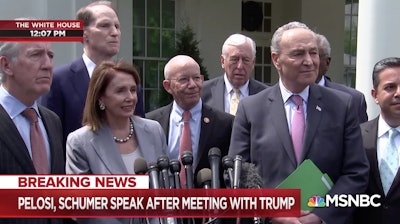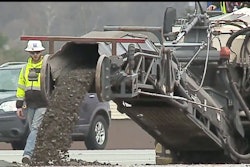 House Speaker Nancy Pelosi (D-Calif.) and Senate Minority Leader Chuck Schumer (D-N.Y.) speak to reporters after meeting with President Trump where they agreed on a $2 trillion infrastructure package. Screenshot from MSNBC video.
House Speaker Nancy Pelosi (D-Calif.) and Senate Minority Leader Chuck Schumer (D-N.Y.) speak to reporters after meeting with President Trump where they agreed on a $2 trillion infrastructure package. Screenshot from MSNBC video.When President Trump met with House Speaker Nancy Pelosi (D-Calif.) and Senate Minority Leader Charles Schumer (D-N.Y.) on Tuesday, they agreed to go after a $2 trillion infrastructure package in spite of their differences, The Hill reports. Pelosi and Schumer described the meeting as “constructive,” and that both sides wanted an infrastructure deal that would “be big and bold,” but said there was no agreement on how to pay for it.
“There was goodwill in this meeting, and that was different than some of the other meetings that we’ve had, which is a very good thing,” Schumer told reporters after the meeting, according to the news agency.
However, Congressional Republicans say they are unlikely to support a $2 trillion infrastructure package, something that could doom its chances in the GOP-controlled Senate.
“How this could be achieved in a fiscally responsible way remains the biggest question,” Rep. Mark Meadows (R-N.C.), chairman of the conservative House Freedom Caucus and a close Trump ally, told The Hill, noting that Republicans are unlikely to support that large a package. “Traditional methods for this increased investment would meet substantial pushback.”
“The devil is always in the details,” added Rep. Mario Diaz-Balart (R-Fla.), top Republican on the Appropriations subcommittee overseeing transportation spending, according to the news agency.
Another meeting is scheduled in three weeks to discuss funding ideas. The Democrats hope the President will bring funding ideas that the Senate will support, while Republicans look for funding ideas from the Democrats.
House Minority Leader Kevin McCarthy (R-Calif.) said his party would not support the idea of paying for the package by hiking the gas tax and rolling back cuts in Trump’s 2017 signature tax law. “The common denominator, no matter what the subject the Democrats bring up, is a tax increase,” McCarthy told reporters before the meeting, according to The Hill.
According to the news agency, during the meeting, the Democrats pitched a plan where the federal government would pay for 80 percent of a project cost with local governments picking up the other 20 percent, while also including a public-private partnership element, but Trump said he would consider his own funding scheme.
Hopefully, this time, Trump and members of Congress from both parties will find some common ground and come to an agreement on how to finance the much-needed infrastructure package. With the 2020 election looming, not many in Washington believe a landmark piece of legislation will move through Congress this year, but Pelosi told reporters she had to live up to her commitment to seek bipartisan agreements to benefit Americans.
“While we may have our difficulties in other areas, we cannot ignore the needs of the American people as we go forward,” Pelosi said, according to The Hill.











